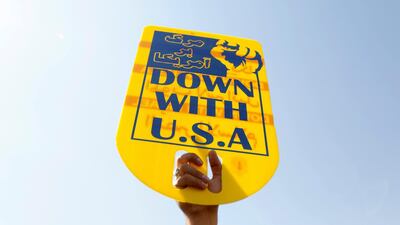Special courts set up in a drive against financial crime have sentenced three people to death in Iran, state television reported on Sunday, as the country faces renewed United States sanctions and a public outcry against profiteering and corruption.
A judiciary official also warned truck drivers holding a strike over pay and high prices that they would face "harsh penalties" if they continued their protests.
The special Islamic revolutionary courts were set up last month to try suspects quickly after Supreme Leader Ayatollah Ali Khamenei called for "swift and just" legal action to confront an "economic war" by foreign enemies.
Judiciary spokesman Gholamhossein Mohseni Ejei, quoted by state TV, said the courts handed down death sentences to three defendants after convicting them of "spreading corruption on earth", a capital offence under Iran's Islamic laws.
Mr Mohseni Ejei did not name the three but said the sentences could be appealed to the supreme court.
Iranian officials have accused the US and Israel, as well as Saudi Arabia and government opponents in exile, of fomenting unrest and waging an economic war to destabilise Iran.
_______________
Read more:
Iran attack: a tangled web of claims and blame
Saudi Arabia supports Donald Trump’s strategy to counter Iran, says Jubeir
_______________
Mr Mohseni Ejei said 32 other defendants were sentenced to jail terms of up to 20 years for economic crimes, official news agency Irna reported.
In May, the US pulled out of a 2015 deal between world powers and Tehran under which international sanctions on Iran were lifted in return for curbs on its nuclear programme.
Washington has reimposed sanctions on Iran, and it is planning heavier sanctions in November aimed at the Islamic Republic's oil sector.
The rial currency has lost about 70 per cent of its value since April, under the threat of revived US sanctions, with heavy demand for dollars among Iranians trying to protect their savings.
The cost of living has also soared, sparking sporadic demonstrations against profiteering and corruption, with many protesters chanting anti-government slogans.
Mr Mohseni Ejei warned truck drivers against protesting for higher wages and affordable parts, after several rounds of arrests.
"Harsh penalties await those who ... block lorry traffic on roads," he told Irna.
General prosecutor Mohammad Jafar Montazeri said last week that protesters could face death sentences under stern laws against highway robbery, state broadcaster Irib reported on Thursday.
On Sunday, 153 members of the 290-seat parliament wrote to the government, urging an amicable resolution of the conflict, in which dozens of striking drivers have been arrested for allegedly blocking roads and trying to pressure colleagues to join the strike.
"A failure to resolve the problems of the truck drivers who make up a group of over 400,000 people has led to disruptions in recent days in the transportation of fuel and goods in the country, while this could be prevented by timely measures," the MPs said.

